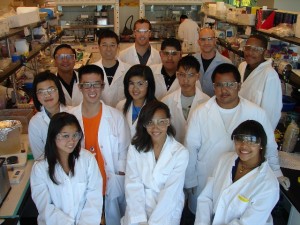
iCLEM, a summer program that provides paid internships to Bay Area high school students, is jointly sponsored by the Joint BioEnergy Institute (JBEI) and the Synthetic Biology Engineering Research Center (SynBERC). (Photo by Kevin Costa, SynBERC)
As anyone who has seen “The Empire Strikes Back” can tell you, sometimes sequels can be even better than their terrific predecessors. Arguably, such is the case with iCLEM – the Introductory College Level Experience in Microbiology program. Now in its fourth year, this unique summer science education program, aimed at high school students who trend outside the typical curve of academic enrichment programs, is bigger and stronger than ever. Eight high school students from the East Bay Area will earn $2,000 upon completion of an eight-week program in which they work in a state-of-the art microbiology laboratory on a research project related to bioenergy. The iCLEM program is sponsored by the Joint BioEnergy Institute (JBEI) and the Synthetic Biology Engineering Research Center (SynBERC), with funding from the U.S. Department of Energy (DOE) and the National Science Foundation (NSF).
“Our 2011 iCLEM students are rising juniors and seniors from public schools located in the East Bay and all of them are budding scientists determined to make the most of the opportunities offered at JBEI,” says Kate Spohr, who heads SynBERC’s education and outreach program and coordinates iCLEM. “This year’s instructional team includes two credentialed high school teachers and three University of California (UC) Berkeley undergraduate research/teaching assistants, who are all majoring in science and minoring in the CalTeach science and mathematics teacher education program.”
The iCLEM program was started in 2007 by Clem Fortman, a metabolic engineering researcher with JBEI’s Fuels Synthesis Division, and James Carothers, who was then a post-doc with appointments at both JBEI and SynBERC.
“The idea was to provide an opportunity that could make a critical difference in the lives of students who are from economically disadvantaged backgrounds and have little or no family history of college attendance,” Fortman says. “We’ve found that given a chance to excel, these students make the most of the opportunity.”
To date, iCLEM alumni have had a 100-percent college acceptance rate with admissions that include the UC campuses at Berkeley, Santa Cruz and Santa Barbara, and Cal Poly San Luis Obispo. Not all the students have gone on to study science at the college level, but there are iCLEM alumni now majoring in molecular and cell biology, engineering and sociology.
The 2011 iCLEM program is under the direction of John Gladden, a molecular and cell biologist with Sandia National Laboratories who is working in JBEI’s Deconstruction Division, identifying microorganisms that can efficiently break down lignocellulosic biomass into fermentable sugars for advanced biofuels. Gladden, working with UC Berkeley undergraduate Milton To, has developed a manual that introduces a formal curriculum and lab protocols to the iCLEM program.
“I am excited to collaborate with this year’s iCLEM students, giving them the opportunity to do cutting edge research at a premier research facility,” Gladden says.
This year’s iCLEM students are Sylvia Allmon, senior, Oakland Technical High School; Braulio Escatel, senior, Oakland Unity High School; Michael Le senior, Oakland Technical High School; Gerardo Martinez, senior, East Oakland School of the Arts; Malik McElroy, junior, El Cerrito High School; Doriana McQuinn, junior, Oakland Charter High School; Marie Natac, junior, Emery Secondary School; and Quan Tran, senior, Berkeley High School.
The instruction team for iCLEM 2011 is comprised of lead teacher Rowan Driscoll, science teacher, department head and athletic director, as well as a National Board certified teacher at Oakland Unity High School; and Chris Tolentino, biology teacher and department chair at Kennedy High, Richmond; plus UC Berkeley students Yanna Chen, Douglas Le and Milton To.
This year’s iCLEM session runs from June 21 to August 11. Students and teachers typically work a schedule that runs from 9:00 am to 5:00 pm, Monday through Friday. In addition to bioenergy research projects, the iCLEM curriculum also includes field trips to Bay Area biotech companies and research universities, and lectures from leading scientists at JBEI and SynBERC.
“It is exciting to watch the iCLEM students grow as researchers and independent learners as the program progresses,” says program coordinator Spohr. “With each new group of iCLEM students, I see infinite possibilities.”
All of the iCLEM laboratory work is carried out at JBEI, which is located in Emeryville. JBEI is one of three Bioenergy Research Centers funded by the U.S. Department of Energy to advance the development of the next generation of biofuels. It is a scientific partnership led by Lawrence Berkeley National Laboratory (Berkeley Lab) and including the Sandia National Laboratories, the UC campuses of Berkeley and Davis, the Carnegie Institution for Science, and the Lawrence Livermore National Laboratory.
SynBERC is also a multi-institution partnership, funded by the National Science Foundation, that is aimed at “making biology easier to engineer.” Its mission is to lay the foundation for the emerging field of synthetic biology through the development of foundational understanding and technologies that will enable researchers to design and build standardized, integrated biological systems that can carry out specific functions. The SynBERC partnership is led by UC Berkeley and includes UC San Francisco, Harvard, MIT, Stanford, and Prairie View A&M University.
Lawrence Berkeley National Laboratory addresses the world’s most urgent scientific challenges by advancing sustainable energy, protecting human health, creating new materials, and revealing the origin and fate of the universe. Founded in 1931, Berkeley Lab’s scientific expertise has been recognized with 12 Nobel prizes. The University of California manages Berkeley Lab for the U.S. Department of Energy’s Office of Science. For more, visit www.lbl.gov.
Additional information:
For more information about JBEI visit the Website at www.jbei.org
For more information about SynBERC visit the Website at http://www.synberc.org/